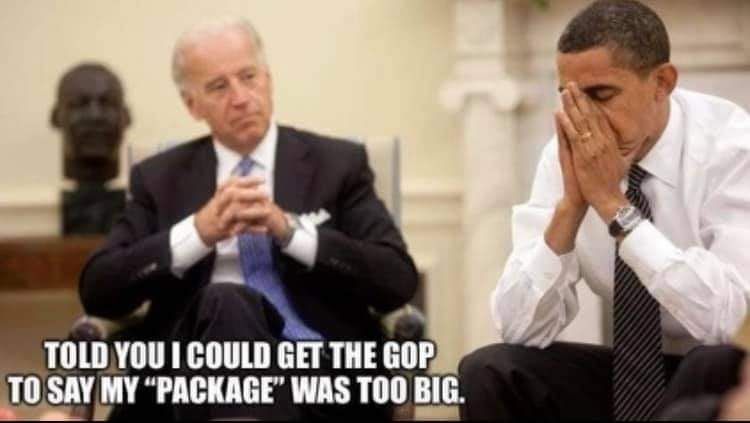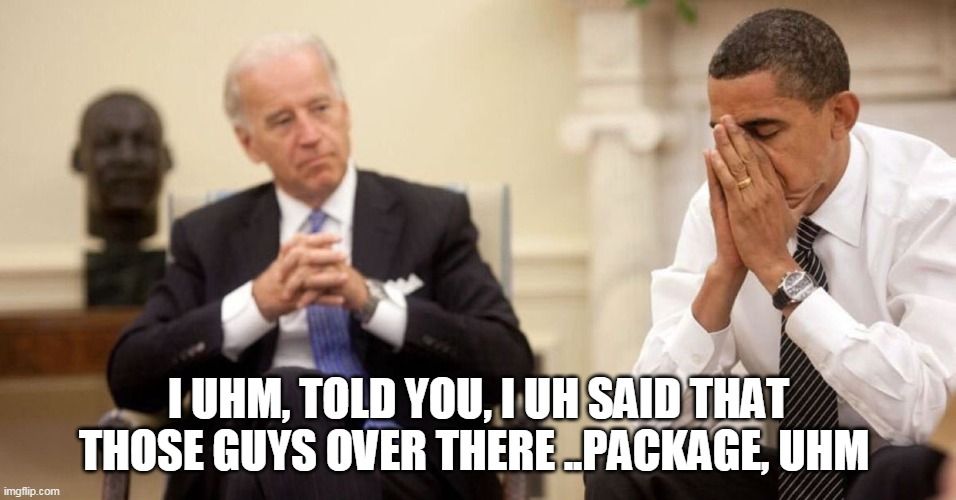The COVID "Relief" Bill
-
Yeah, it's the RWEC.
But I'll eagerly agree should anyone disprove any of these items:
- $1 Billion for ‘Racial Justice’ for Farmers
“The $1.9 trillion coronavirus stimulus package being pushed by President Biden puts more than $1 billion toward ‘socially disadvantaged’ farmers and related groups — including an equity commission, agricultural training and other assistance to advance racial justice in farming,” Fox News reports.
- $50 Million for ‘Environmental Justice’ Grants
The legislation allocates $50 million for “environmental justice” grants via the Environmental Protection Agency. The Republican Study Commission decried these grants as a “thinly-veiled kickback” because much of this money will end up going to left-wing political groups.
- $112 Million for California Transit Project
In an expenditure with zero apparent connection to COVID-19, the new bill allocates $112 million for the “Bay Area Rapid Transit (BART) expansion” program. The money would largely go to a specific “underground rail project in Silicon Valley for which planning has been going on for several years but hasn't yet broken ground,” Fox Business reports.
- $10 Million for Native American Language Preservation
Slipped into the seemingly endless bill text is a $10 million appropriation to “ensure the survival and continuing vitality of Native American languages during and after the public health emergency.”
- $200 Million for Museum and Library Services
Museums and libraries are, for the most part, closed across the country. Yet under this bill, the Institute of Museum and Library Services (did you even know that was a thing?) would be allocated $200 million in taxpayer money.
- $750 Million for ‘Global Health’
One might expect the US Congress’s COVID-19 legislation to focus on, well, the US. But the new legislation allocates a whopping $750 million for the Centers for Disease Control to spend on global health problems and vaccination efforts in other countries.
- $750 Million for Native American Housing
The bill also allocates $750 million—on top of existing and prior funding—for “housing assistance and supportive services programs for Native Americans.”
- Expansion of Obamacare Subsidies
House Democrats have long sought to expand Obamacare subsidies and eliminate caps that prohibit them from going to high-income individuals. Unable to find the votes to do so via the normal legislative process, they’ve simply slipped this partisan priority into their “COVID” relief legislation.
- Billions for Public Schools Whether They Reopen or Not
The behemoth legislation doles out $129 billion for K-12 schools, ostensibly earmarked for helping them reopen. But it’s actually just a handout for teachers’ unions and public schools. They get the money regardless of whether they reopen or not, and much of it is allocated for spending in 2022 through 2028, long after the pandemic.
Libraries, subways and "environmental justice."
Yeah...
-
Another view (cited in the article above). A trillion dollars of pork.
=-=-=-=-=-=-=-=-=-=-=-=-=-=
Let’s dig into the various House committee bills to separate the Covid from the chaff. The Covid cash includes some $75 billion for vaccinations, treatments, testing and medical supplies. There’s also $19 billion for “public health,” primarily for state health departments and community health centers. One might even count the $6 billion to the Indian Health Service, or $4 billion for mental health.
The package also hands more to businesses and individuals most hit by lockdowns. That includes $7.2 billion more for the Paycheck Protection Program, $15 billion for economic injury disaster loans, $26 billion for restaurants, bars and live venues, and $15 billion in payroll support for airlines. The recipients of this taxpayer money will at least be required to prove economic harm, and in some cases repay loans.
Not so the recipients of the $413 billion in checks Democrats intend to send to households far and wide, at $1,400 per man, woman and dependent, that begins phasing out at $75,000 of individual income. The Congressional Budget Office says the bill’s unemployment provisions will increase deficits by $246 billion, and that its $400 a week in federal “enhanced” unemployment benefits through August “could increase the unemployment rate as well as decrease labor force participation.” So much for economic stimulus.
All told, this generous definition of Covid-related provisions tallies some $825 billion. The rest of the bill—more than $1 trillion—is a combination of bailouts for Democratic constituencies, expansions of progressive programs, pork, and unrelated policy changes.
• Start with the $350 billion for state and local governments and cities and counties, even as state revenues have largely recovered since the spring. Democrats also changed the funding formula to ensure most of the dollars go to blue states that imposed strict economic lockdowns.
Last year’s Cares Act distributed money mainly by state population, but much of the $220 billion for states in the new bill will be allocated based on average unemployment over the three-month period ending in December. Andrew Cuomo’s New York (8.2% unemployment in December) and Gavin Newsom’s California (9%) get rewarded for crushing their businesses, while Kristi Noem’s South Dakota (3%) is penalized for staying open. These windfalls come with few strings attached.
• The bill includes $86 billion to rescue 185 or so multiemployer pension plans insured by the Pension Benefit Guaranty Corp. Managed jointly by employer sponsors and unions, these plans are chronically underfunded due to lax federal standards and accounting rules. Yet the bailout comes with no real reform.
• Elementary and secondary schools get another $129 billion, whether they reopen for classroom learning or not. Higher education gets $40 billion. The CBO notes that since Congress already provided some $113 billion for schools—and as “most of those funds remain to be spent”—it expects that 95% of this new money will be spent from 2022 through 2028. That is, when the pandemic is over.
• Enormous sums go to expanding favorite Democratic programs. The package adds $35 billion to pump up subsidies to defray ObamaCare premiums. The bill eliminates the existing income cap (400% of the poverty level) on who qualifies for subsidies, and lowers the maximum amount participants are expected to contribute to about 8.5% of their income, down from 10%.
The bill also spends $15 billion to provide a temporary five percentage-point increase in the federal Medicaid match to states that expand eligibility to lower-income adults. This is bait for the dozen or so states that have resisted ObamaCare’s Medicaid expansion, which enrolls working age, childless adults above the poverty line. The political goal overall is to chip away at private coverage on the way to Medicare for All.
• There’s $39 billion for child care; $30 billion for public transit agencies; $19 billion in rental assistance; $10 billion in mortgage help; $4.5 billion for the Low Income Home Energy Assistance program; $3.5 billion for the program formerly known as food stamps; $1 billion for Head Start; $1.5 billion for Amtrak; $50 billion for the Federal Emergency Management Agency; $4 billion to pay off loans of “socially disadvantaged” farmers and ranchers; and nearly $1 billion in world food assistance.
• Don’t forget the $15 an hour minimum wage, which CBO estimates will cost 1.4 million jobs. The bill increases the child tax credit to $3,000 from $2,000 ($99 billion) and temporarily expands the Earned Income Tax Credit to certain additional childless adults ($25 billion). It eliminates the cap on the rebate that drug makers must pay Medicaid for outpatient drugs. This is a rare provision that increases federal revenue ($16 billion), though only by undermining pharmaceutical innovation.
• This being Congress, Members are also slipping in pet causes. Our favorite is $1.5 million for the Seaway International Bridge, which connects New York to Canada and is a priority for New York Sen. Chuck Schumer. And don’t overlook the nearly $500 million for, as the CBO puts it, “grants to fund activities related to the arts, humanities, libraries and museums, and Native American language preservation.”
No wonder Democrats want to pass all this on a partisan vote. It’s a progressive blowout for the ages that does little for the economy but will finance Democratic interest groups for years. Please don’t call it Covid relief.
-
-
More Republican Lawmakers Tout Covid Relief Funds They Voted Against
The article gives many examples of GOP lawmakers who voted against the COVID relief bill then, but are now trying to take credit as they tout its benefits to their constituents.

